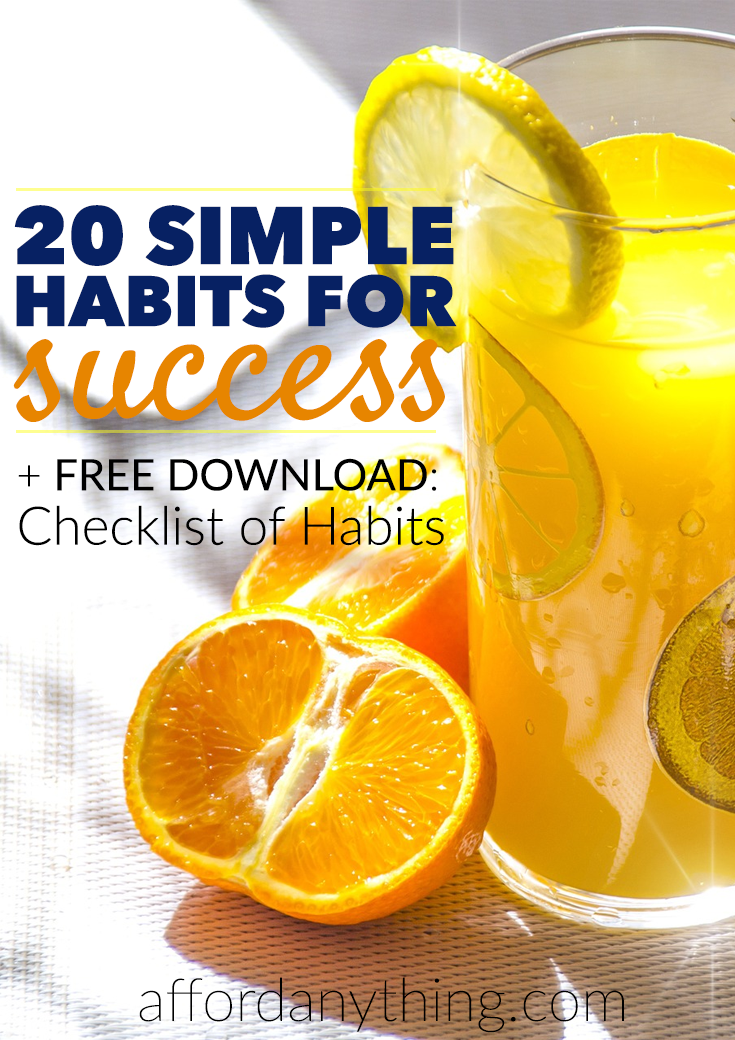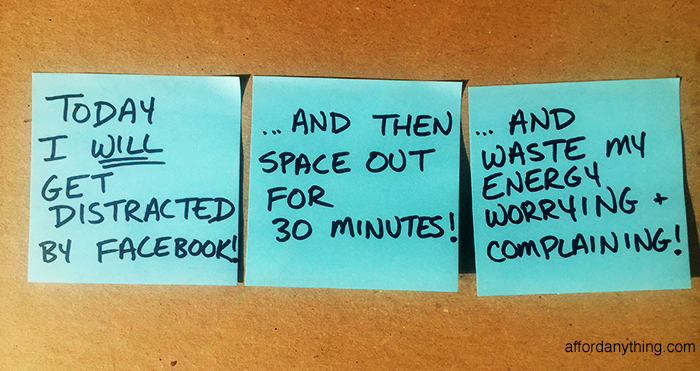
How many days have you felt like this?
You toss and turn all night. Wake up groggy. Curse at the alarm.
You stumble through a morning fog. You’re drowsy, even after two cups of coffee. You stare at the computer screen feeling overwhelmed and unfocused. You get sucked into Email Hell. You spend the rest of the day bouncing between interruptions and distractions.
You finish the day knowing you’ve accomplished nothing.
You’re frustrated. You want to accomplish so much. Launch a business. Travel. You have a vision for your life. But days, weeks, months tick by without progress.
You’ve chastised yourself to “work harder.” You’ve given yourself pep talks. And yet … yet … you can’t break the cycle.
Sound familiar?
Let’s fix it.
First, let’s identify a few common problems:
You’re sleep-deprived. You’re not exercising. You eat junk.
Your mornings suck. Afternoons are worse. You bounce from task-to-task. By evening you’re exhausted, but you’re not sure how you spent your day.
“Okay, okay, stop making me feel bad. What’s the solution?”
You hold the answer.
You’ve developed habits — hundreds of habits, which you repeat daily. You brush your teeth, tie your shoelaces and wear clean underwear out of sheer habit. You don’t give yourself pep talks.
If you want to move closer to your goals, forget motivation. Forget willpower. Focus on building strong habits.
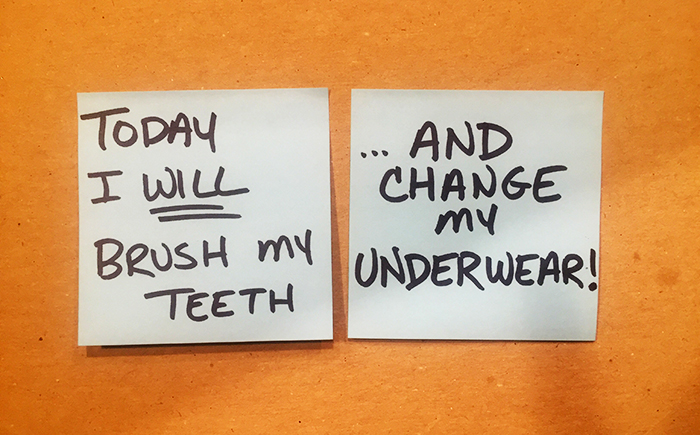
I’d like to share some of my favorite habits and tools that improve my focus, energy and output. When I stick to these, I get results. When I don’t, I work harder but accomplish less.
I’ve organized this article into three sections:
- How to create energized mornings
- How to stay focused all day
- How to sleep deeply and wake up refreshed
As always, take what works, tweak as needed, and ignore the rest. If something doesn’t fit into your life/work, skip it and move on.
If you’d like a PDF of these habits to print or save to your computer, you can download one for free below.
Make Mornings Awesome
Here are six ways that I energize my morning.
#1: Drink a Pint of Water
Your body dehydrates while you sleep. (Do you pee yellow in the morning?) As a result, you’re less focused in the morning.
I drink a pint of water (16 oz.) the moment I wake up. I’ll squeeze a lemon into the water (this helps) for an extra kick.
I turned this into a habit by associating it with an existing habit. You could do the same. Find a trigger; an action you perform every morning. Here are a few choices:
- Before you brush your teeth
- Before your morning coffee
- Before you wear shoes
Immediately follow one habit with the other. Your mind will bundle these together as the same action.
#2: Eat Protein
Eat protein and complex carbs when you wake up, even if you’re not hungry. My favorite is two eggs, hard-boiled or over easy, with a small bowl of lentils or beans.
How do you start this habit? If you eat breakfast, the action is ingrained. Change only the food (if needed); don’t change the routine.
If you don’t eat breakfast yet, find a trigger. Do you brew coffee? This is your ‘anchor.’ Drop your new habit into this spot. Start with food that requires almost-no prep or cleanup. The easier, the better.
#3: Exercise for Two Minutes
I spent years telling myself I “didn’t have time” to exercise in the morning. Then I discovered this routine:
Stretch for one minute. I mean this literally. Set the timer on your phone for 60 seconds. When the timer finishes, try jumping jacks, burpees, or planking for one minute. Total time commitment: two minutes.
What’s the point? You’ll feel better (even after two minutes). More importantly, you’re building a habit. Two minutes can later extend to four minutes, which becomes eight. Nice job.
#4: Focus on Marginal Gains
Add other steps into this morning chain, such as journaling, reading, or practicing a foreign language. Just start small.
If you launch with an ambitious 20-minute goal, you’ll quit at the first inconvenience — before habit-formation. Instead, create marginal gains. If you don’t meditate yet, start with one to two minutes. You can’t scale unless you’ve cemented the habit first.
#5: Maintain the Chain
Tie these habits together, so every action leads to the next. For example:
Use toilet > brush teeth > drink water > meditate > stretch > exercise > shower > dress > brew coffee while making breakfast.
This is a chain. Every action triggers the next one. If you maintain the chain for 3-4 weeks, these actions convert into habits. Your job is to protect the chain.
Which leads to the next tip …
#6: Build a Playlist
Listen to the same playlist every morning. You’ll start associating sounds with actions.
You brush your teeth when the music starts. You drink water at the chorus. You start stretching at this particular verse.
Your morning playlist turns into a series of triggers. When you hear this sound, you take this action.
As a bonus, the music sets the pace. You won’t need to check the clock.
(Thanks to Charles Duhigg, Leo Babauta and Hal Elrod, whose writings inspired the tips above.)
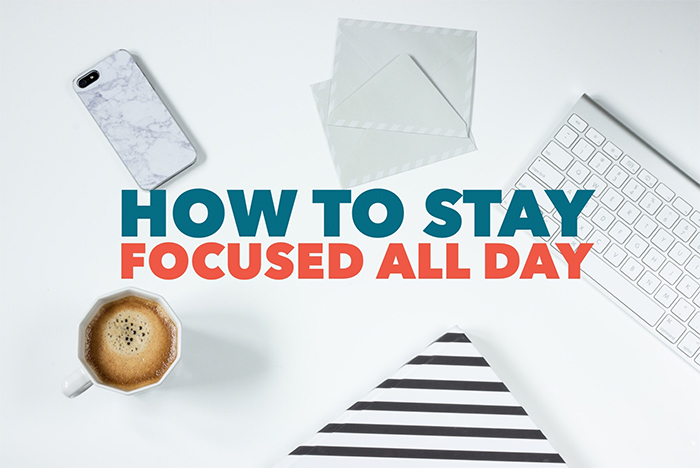
How to Stay Focused
Here are a few tips that help me stay focused at work.
#1: Plan Every Hour
I finish every workday by planning the following day’s tasks. I’ll start the day by reviewing this plan. For example:
- Edit blog post (9 am – 11 am)
- Draft lesson for real estate course and send feedback on video (11 am – 3 pm)
- Podcast interview (3 pm – 4 pm)
- Email the online business list (4 pm – 5 pm)
- Answer email, comments and social media (5 pm – 7 pm)
Of course, nothing goes according to plan. Every action expands beyond the time I give it (damn you, Parkinson!)
Yet daily planning is critical. It helps me spot inefficiencies. It shows me what tasks to eliminate/automate/delegate. Without a plan, I sit at my computer thinking “????,” wander into the Dark Depths of Email Hell, and achieve nothing.
Planning is more important than sticking to a plan. It creates a daily habit of contemplation about how to invest your time.
#2: Use E.ggtimer
I use e.ggtimer.com to countdown the time I’ve allocated a task – 60 minutes for this, 90 minutes for that. Limiting task time helps me take advantage of Parkinson’s Law.
Remembering to use this tool is the toughest part. How can you make this a habit?
- Hide every browser tab except e.ggtimer and mission-critical tabs. (OneTab is great for this.)
- Set the timer.
- Repeat.
When you limit browser tabs, you limit distractions, take action on the open tabs, and repeat until it’s second nature.
#3: Skip Lunch
This seems counterintuitive: Skip your lunch break (unless you’re meeting someone). Nothing kills productivity like a heavy meal.
I nibble on snacks throughout the day. This carries two benefits:
- I avoid a mid-afternoon energy crash.
- I take multiple mini-breaks instead of one prolonged hiatus.
How can you start this habit?
- Keep healthy snacks at your desk. I like cashews, oranges and protein bars.
- Sip a smoothie while you work.
- Drink loads of water.
Sure, your desk will resemble a dining table. But you’ll snack without noticing, which means you won’t be ravenous at lunchtime.
By the way, here’s the world’s easiest smoothie recipe:
- Spinach
- Kale
- Mixed berries (CostCo frozen)
- Water
- Optional: banana for sweetness; cucumber for flavor.
Keep a pint at your desk; you’ll absentmindedly sip throughout the day.
#4: Plan Tomorrow
Before you finish working, plan the following day. Create an hour-by-hour plan, like I covered in the example above.
Use any tool except email: Evernote, Google Calendar, whatever. I use a physical notepad and pen, which denotes heft in a world where everything is digital.
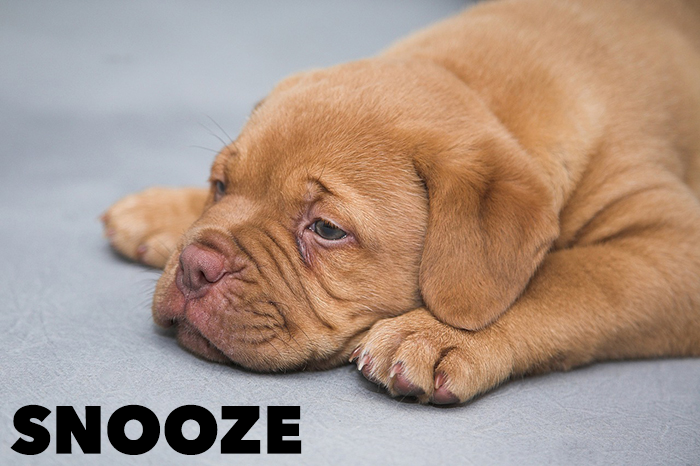
Snooze to Success
Sleep is crucial to productivity. Yet most people (myself included) are sleep deprived anyway. Here’s how I battle restlessness:
#1: Remove Blue-Wavelength Light
“… Exposure to excessive light at night, including extended use of various electronic media, can disrupt sleep,” the American Medical Association says. Duh. Sounds obvious.
But they threw a curveball: “This effect can be minimized by using dim red lighting in the nighttime bedroom environment.” Whaaa??
As it turns out, the human eye contains a photoreceptor called melanopsin, which is tied to the section of our brain that controls our sleep/wake rhythm. Melanopsin is sensitive to blue-green visible light. Studies show a strong link between alertness and blue light exposure.
That’s not surprising if you think about it. The natural daylight spectrum is packed with blue light. Campfires and candles grow red. Not a coincidence that blue light triggers alertness while red light doesn’t.
Laptop, iPad and TV screens imitate natural daylight, which keeps our brains buzzing. Sure, it’s best to avoid screens after dusk, but let’s be realistic. The second-best choice is to remove the blue wavelengths.
Use a free browser extension like f.lux or g.lux, which automatically remove blue-spectrum lighting when you work late. (This is a tool, not a habit — but it’s awesome.)
#2: Exercise 20 Minutes a Day
Exercising at least 2.5 hours per week correlates with falling asleep faster and waking up refreshed, according to a study of 2,600 adults. That’s 20 minutes a day. It can take awhile to build to 20 minutes; start with two minutes to establish the habit.
One problem — working out too late disrupts sleep in some people (myself included), thanks to elevated body temperature and adrenaline. As an alternative, try bedtime yoga on YouTube.
#3: Never Sleep Hungry
Most fitness experts recommend avoiding late-night snacks. But I’ve found that slumbering with an empty stomach leads to bleary mornings.
Solution? Eat one tablespoon of peanut butter before bed. (Or try cashew, almond, whatever nut is trendy this month.) Link this to a habit chain: spoon, water, toothbrush.

#4: Drink a Pint
Guzzle a pint of water (16 oz.) before bed. If chugging is unpleasant, sip while you’re winding down. Speaking of which …
#5: Unwind for 30 Minutes
One of my worst habits is trying to leap from working (emails, planning, writing) to sleeping, without any intervening buffer. Even if I resist screens (e.g., writing on a legal pad), my mind races with work-related thoughts, which interferes with sleep.
Recently I started a wind-down period. I’ll spend 30+ minutes reading a book, which might be about business/finance, but also might cover any random topic. Recent books I’ve read include this paperback by John Grisham, this classic on the magic of thinking big, this treatise on writing well, and this embarrassment that exposes me as a crazy cat lady.
(P.S. — If you have trouble sleeping, read this.)
#6: Wear a Sleep Mask
Did anyone read Chelsea Handler’s memoir?
In one scene, Chelsea gets thrown in jail for a night. Her arrest doesn’t phase her, though. She’s more upset about the fact that her jailers didn’t provide a sleeping mask.
I can relate. (Well, not to the jail part.) I share her overzealous enthusiasm for eye masks.
Light disrupts sleep. Blackout curtains help, but not enough. Sleeping masks are better, plus they’re dirt-cheap.
I like these so much that I own three: one that lives next to my bed, another stashed in my luggage 24/7, and one for my laptop case (why, I’m not sure).
To kickstart the habit, keep your sleeping mask on your pillow. You’re more likely to use it when it’s as convenient as possible.
#7: Avoid Caffeine After 11 a.m.
I don’t drink caffeine in the afternoon (well, most of the time). When I break my own rule, I notice. Caffeine is terrible for sleep, even hours later.
#8: Carry Earplugs
I live in downtown Las Vegas, which means 3-4 nights every week I fall asleep against the high-pitched shrill of tourists belting Katy Perry lyrics as they stumble past my building, searching for the nearest roulette table. Sigh. Baby, you are a firework.
As you might imagine, I love earplugs.
If you live somewhere reasonable, you won’t need earplugs at home, but carry these when you travel. They’re helpful for snoozing in airplanes, hotels and anywhere with unpredictable noise.
Easy implementation: Toss a few earplugs into your luggage/laptop case, where they’ll live forever. Grab them when you need them. And trust me, you’ll know when you’ll need them.
#9: Listen to Boring Bedtime Stories
When earplugs aren’t enough, or when my mind is racing (“what’s the point of life? Do those pants fit? What do fish think?”), I listen to this sleep podcast. The host tells unbearably boring stories that conk you out. (Don’t worry; this is intentional.)
To boost monotony, I listen to the same episode every time (this one). To skip straight to the snoozefest, start at the 22-minute mark. (The first 22 minutes are dull, but not sufficiently sleep-inducing.)
Feel free to share suggestions for other sleep-inducing podcasts in the comments. (Uh-oh. I hope nobody says mine …)
#10: Buy a Great Pillow and Mattress
My junior year of college, I slept on an inflatable camping pad for months until I received a free hand-me-down mattress.
Ugh. I’m definitely not 19 anymore.
If you have discretionary cash, buy a comfy mattress and pillow. It’s not an “investment,” but it’s a damn good consumer purchase. If you’re budget-conscious, get a good pillow and mattress topper.
Time is Your Most Limited Asset
As I’ve mentioned in other articles, time is your most valuable asset. You can’t earn more; you can only spend wisely. Developing strong habits can save hours — or days — of otherwise squandered time.
You can wake up well-rested and hydrated. Enjoy your morning. Dive into work with enthusiasm. Maintain focus. Smile more. And fall asleep knowing you’re one step closer to a better life.
